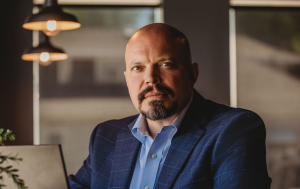After Synapse Collapse and Evolve Bank Action, U.S. Banks Confront a Reckoning in BaaS
Federal crackdown on fintech partnerships prompts renewed focus on strategy, structure, and oversight.
One such firm is amBaaSsador, a Missouri-based strategy and education consultancy founded by former bankers, fintech operators, and compliance experts. The company, which works exclusively with financial institutions exploring or operating within the BaaS model, has seen a sharp uptick in demand from banks seeking clarity, structure, and trusted support amid growing regulatory pressure.
“This moment is a wake-up call,” said Steve Bishop, President of amBaaSsador and a 25-year veteran of financial sales, operations, and regulatory change management. “We’re watching in real-time what happens when partnerships are built on velocity instead of due diligence. Synapse wasn’t just a fintech failure—it was a systemic breach of trust across an entire ecosystem.”
Founded in response to the rapid, and often chaotic, expansion of the BaaS model over the last decade, amBaaSsador provides advisory support, education programs, and strategic guidance to banks and credit unions looking to safely engage—or re-engage—with embedded finance and fintech partnerships. The firm does not represent fintechs or vendors, maintaining a strictly bank-first mandate in its advisory work.
In April 2024, Synapse filed for Chapter 11 bankruptcy after a year of financial instability, resulting in frozen end-user accounts and loss of access to funds for partner fintechs. The ripple effects were immediate. Consumers were left without basic financial access. Fintech founders scrambled to restore trust. And banking partners—some of whom had been relying on Synapse to manage accounts, KYC, and compliance—were exposed to direct regulatory scrutiny.
On May 14, 2025, Evolve Bank & Trust, one of Synapse’s major partners, was served a cease-and-desist order by the Federal Reserve, citing “unsafe and unsound banking practices.” According to the order, the bank had failed to properly oversee fintech partners and vendor activities, in violation of third-party risk management expectations.
“The regulators are no longer asking politely,” Bishop said. “They’re making it very clear: banks cannot outsource responsibility. That includes compliance, consumer protection, and operational transparency—even if you’re working with a Silicon Valley unicorn.”
The FDIC’s proposed rule, requiring near real-time reconciliation of all fintech partner accounts, is now being informally dubbed “The Synapse Rule.” Industry analysts believe it could fundamentally reshape the operating model for BaaS providers and their bank sponsors—especially smaller community banks that lack robust tech infrastructure.
amBaaSsador’s work focuses on helping financial institutions develop long-term, compliance-first strategies for BaaS participation. Their approach includes internal readiness assessments, partner due diligence frameworks, and executive-level education sessions that contextualize regulatory updates and operational best practices.
“We’re not telling banks to avoid fintech,” said Bishop. “We’re showing them how to do it right—how to build real accountability, design contracts that stand up under regulatory scrutiny, and create oversight models that actually work in practice.”
In recent months, amBaaSsador has been working with multiple institutions that had paused fintech programs after the Synapse crisis, helping them map out paths to restart those programs responsibly. Bishop emphasizes that trust, both with regulators and with customers, is now the currency of the BaaS ecosystem.
“This isn’t just a financial story—it’s a trust story. The institutions that win the next chapter of BaaS will be those that treat trust as infrastructure,” he said.
The rapid growth of BaaS in the early 2020s—spurred by demand for embedded finance, neobank partnerships, and digital onboarding—meant that many banks jumped into the model without long-term operational planning. According to Bishop, that era is over.
“What we’re seeing now is a recalibration. Banks are no longer chasing logos or deposits at any cost,” he said. “They’re asking: What does sustainable fintech partnership actually look like? How do we prepare for the next exam cycle? What role do we want to play in this space—and on whose terms?”
In a March 2025 joint statement, the FDIC, OCC, and Federal Reserve reinforced that banks remain fully accountable for the actions of their third-party partners, warning against “compliance outsourcing” and “opaque contractual relationships.” Bishop believes the message is finally landing.
“Regulators have drawn a clear line in the sand. If you offer BaaS, you need the oversight muscle, the documentation, the operational controls—and the board-level awareness to back it up.”
As 2025 continues to bring regulatory developments, enforcement actions, and growing caution among fintech investors, amBaaSsador expects the BaaS market to consolidate around fewer—but stronger—players.
“We’re going to see fewer partnerships, but higher-quality ones,” Bishop said. “It’s not about pulling back from innovation. It’s about maturing into it.”
He remains optimistic about the long-term future of BaaS if the sector embraces what he calls “strategic patience.”
“This is still one of the most promising models for delivering modern financial services,” he said. “But we have to trade speed for sustainability. That’s the challenge—and the opportunity—right now.”
Alfie Brown
AB MEDIA
+44 7876 586946
email us here
Visit us on social media:
LinkedIn
Legal Disclaimer:
EIN Presswire provides this news content "as is" without warranty of any kind. We do not accept any responsibility or liability for the accuracy, content, images, videos, licenses, completeness, legality, or reliability of the information contained in this article. If you have any complaints or copyright issues related to this article, kindly contact the author above.
Overdrive Digital Marketing Launches Plan with Free Website, SEO, and Google Ads
PipeDreams Acquires H&H Heating & Air Conditioning, Expanding Footprint into Greater Philadelphia
Rayo Credit participará en el Fintech Summit CR 2025: tecnología y datos para la inclusión financiera
Więcej ważnych informacji
 Jedynka Newserii
Jedynka Newserii

 Jedynka Newserii
Jedynka Newserii

Konsument

Tylko 35 proc. Celów Zrównoważonego Rozwoju ONZ możliwe do osiągnięcia przed 2030 r. Potrzebna ściślejsza współpraca międzynarodowa
Jak wynika z raportu ONZ, choć w ciągu ostatniej dekady dzięki dążeniu do realizacji przyjętych celów udało się poprawić życie milionów ludzi na całym świecie, to jednak tempo zmian pozostaje zbyt wolne, by dało się je osiągnąć do 2030 roku. Postęp hamują przede wszystkim eskalacja konfliktów, zmiana klimatu, rosnące nierówności i niewystarczające finansowanie. Jak wynika ze sprawozdania Parlamentu Europejskiego, problemem jest także brak ścisłej współpracy międzynarodowej i sceptyczne podejście niektórych państw ONZ.
Przemysł spożywczy
UNICEF: Wszystkie dzieci poniżej piątego roku życia w Gazie cierpią z powodu niedożywienia. Sytuacja jest katastrofalna

Ataki Izraela na Strefę Gazy i jej izolacja doprowadziły do całkowitego załamania podstawowych usług i ograniczenia możliwości dostaw i dystrybucji pomocy humanitarnej – wskazuje UNICEF. W efekcie setki tysięcy Palestyńczyków są w sytuacji ciągłego zagrożenia życia i cierpią z powodu niedożywienia i głodu. Ta klęska dotyczy praktycznie wszystkich dzieci poniżej piątego roku życia. Konflikty są jednym z głównych przyczyn braku bezpieczeństwa żywnościowego, głodu i niedożywienia na świecie. Szczególnie dotyczy to Afryki i Azji Zachodniej.
Prawo
Branża ciepłownictwa czeka na unijną i krajową strategię transformacji. Liczy na większe fundusze i korzystne regulacje

Komisja Europejska zapowiedziała rozpoczęcie w I kwartale 2026 roku prac nad strategią dla ciepłownictwa i chłodnictwa. Nad tym strategicznym dokumentem w zakresie ciepłownictwa pracuje także polski rząd. Branża podkreśla, że obie te strategie będą miały kluczowe znaczenie dla trwającej transformacji w ciepłownictwie, czyli przyszłości ogromnych inwestycji, które czekają sektor do 2050 roku. Jednocześnie apeluje o większe wsparcie tego procesu ze środków publicznych.
Partner serwisu
Szkolenia

Akademia Newserii
Akademia Newserii to projekt, w ramach którego najlepsi polscy dziennikarze biznesowi, giełdowi oraz lifestylowi, a także szkoleniowcy z wieloletnim doświadczeniem dzielą się swoją wiedzą nt. pracy z mediami.


![Nestlé w Polsce podsumowuje wpływ na krajową gospodarkę. Firma wygenerowała 0,6 proc. polskiego PKB [DEPESZA]](https://www.newseria.pl/files/1097841585/fabryka-nesquik_1,w_85,r_png,_small.png)






.gif)

 |
| |
| |
|